| |
| |
| |
| Presented By First Five Years Fund |
| |
| Axios World |
| By Dave Lawler ·Nov 04, 2021 |
| Welcome back to Axios World, which comes to you tonight from the COP26 climate summit in Glasgow. - I hope tonight's edition (1,981 words, 7 ½ minutes) gives you a flavor of what the conference has been like. And I hope to soon get a flavor of what Glasgow is actually like beyond the conference center's walls.
- Heads up: I'll be off on Monday, so World will be in the capable hands of Zach Basu.
|
| |
| |
| 1 big thing: China feels the heat at COP26 |
 |
|
| Photo illustration: Brendan Lynch/Axios. Photo: Mario De Fina/Getty Images |
| |
| GLASGOW, Scotland — The EU's top climate negotiator tells Axios he's expecting friction with China as negotiations heat up at the COP26 climate summit in Glasgow. What they're saying: Chinese climate envoy Xie Zhenhua fired a shot across the bow Tuesday by warning that countries pushing to amend the Paris Accord's temperature target risked "destroying consensus" and unraveling the talks. - "We all know China is worried because the more you focus on a more ambitious temperature goal, the more you're forced to focus on what China does next," Jacob Werksman, the EU negotiator, tells Axios after a news conference on Thursday. "It's just the math in terms of where the emissions are coming from."
- Beijing is feeling the heat in Glasgow. U.K. Prime Minister Boris Johnson has publicly prodded China to shift its target for peak emissions from "before 2030" to 2025. President Biden went several steps further, scolding President Xi Jinping for skipping the summit.
- Werksman said the EU wants to keep the pressure on and is already pressing the next hosts, Egypt, to structure COP27 "in such a way that continues to bring pressure on China," rather than protecting its bilateral relationship with Beijing.
The other side: Xie rejected the idea — pushed by a bloc that includes the EU, U.S., U.K. and many highly vulnerable countries — of committing to keep the rise in global temperatures below 1.5°C, rather than the Paris Accord's target of "well below" 2° C and ideally 1.5°C. - Xie told the BBC that if the target is changed, "many countries" would want to renegotiate other aspects of Paris, like the funding developed countries agreed to provide to help developing countries adapt.
- Chinese officials feel rich countries, the U.S. in particular, keep ratcheting up promises that could ultimately prove empty while using them to pressure China, says Li Shuo, who is based in Beijing for Greenpeace. 1.5°C would be another hammer to hit China with.
- "What you have in China is more and more implementation, but the headline targets are not up to the ambition that we need. What you have in the U.S. is completely the opposite," Li said.
Behind the scenes: Xi's absence was keenly felt, and the Chinese officials that are here have kept a very low profile, particularly in comparison with the ever-present U.S. delegation. - Several delegates and leaders from developing countries have quietly expressed disappointment that China appears to be MIA.
What to watch: COP26 is unlikely to result in a firm commitment to 1.5°C, but Werksman said the EU is pushing in the negotiations to establish "political moments of accountability" at every COP, rather than every five years. - If countries feel compelled to submit updated climate plans every year, the spotlight will inevitably continue to fall on the largest emitter: China.
Between the lines: Changing a number in a document won't remove any carbon from the atmosphere, but it's an article of faith at COP that higher ambitions and public pressure will translate to increased action. - The rallying cry of "keep 1.5 alive" has been oft-repeated in Glasgow, but current pledges fall far short and time is running out.
Nonetheless, it's a matter of survival for small island states, says Satyendra Prasad, Fiji's ambassador to the UN. - "We cannot contemplate a future beyond 1.5°," he tells Axios Thursday on the sidelines of the summit. "No one would want to agree to an outcome where some of our countries cease to exist."
|
    |
| |
| |
| 2. "We are dying a slow death due to carbon emissions" |
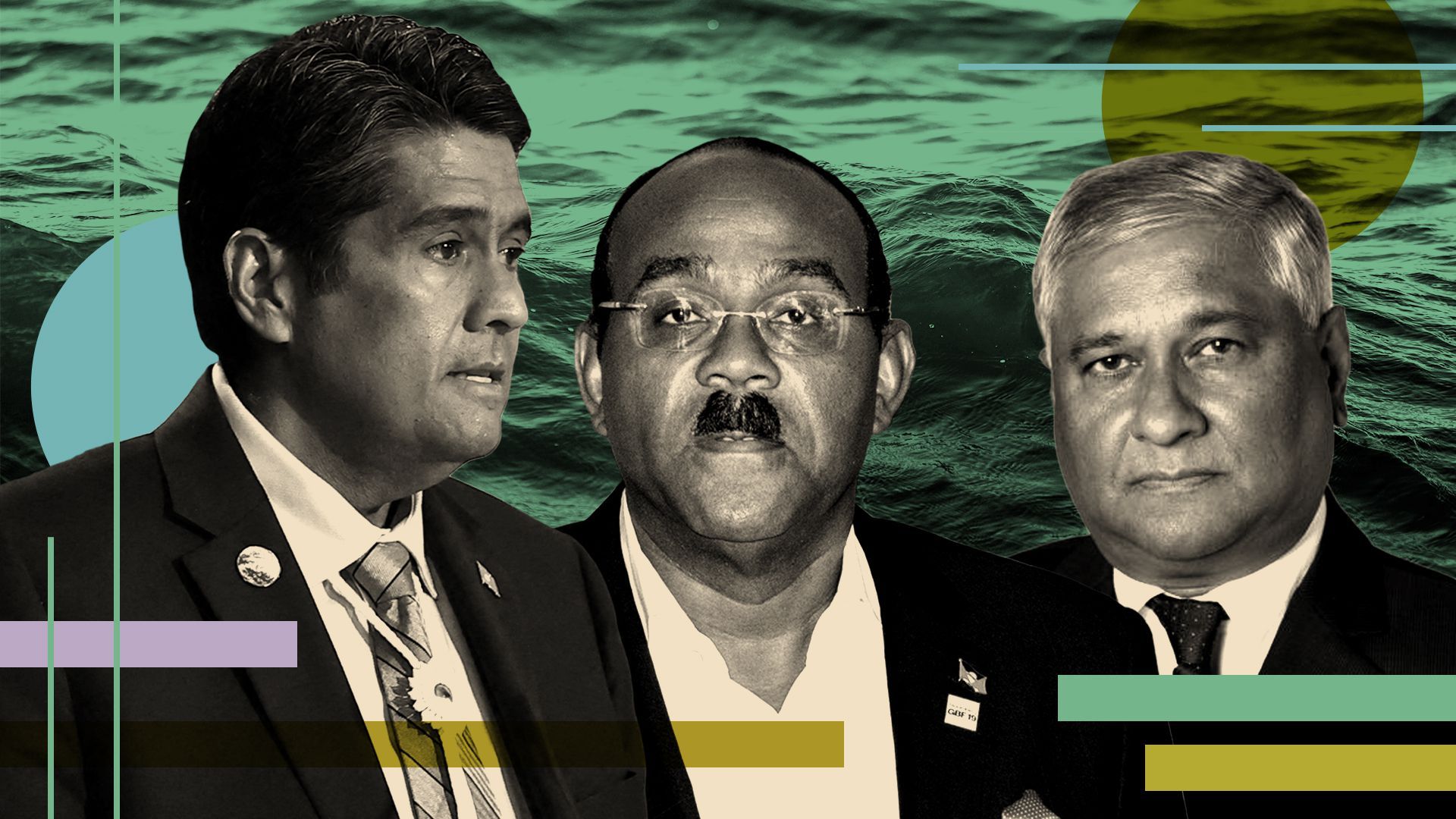 |
|
| Photo illustration: Shoshana Gordon/Axios. Photos: Courtesy of Dr. Satyendra Prasad, Adrian Dennis/AFP, Tiffany Hagler-Geard/Bloomberg via Getty Images |
| |
| Countries like Fiji are caught in a constant cycle of rebuilding after disasters and increasing resilience to the next one. - "It is a choice between extending health care or ensuring that communities can be relocated," Prasad says.
- "It is a choice between improving the quality of education for children in primary schools versus repairing the infrastructure."
Within some of the time frames being discussed at COP26 — $100 trillion by 2050, net zero by 2070 — those choices could include relocating entire countries. - President Surangel Whipps of Palau grows emotional when considering the burden this all puts on younger generations.
- "I'm a parent. Don't you care about your children? ... You have to give them hope."
Antigua and Barbuda Prime Minister Gaston Browne makes no secret of who he blames for this existential threat: big emitters like the United States and China. - "They are not only destroying lives, they're destroying livelihoods," he told me. "And if this situation continues, the alternative situation is literally losing our lives, losing our civilization in the Caribbean, Pacific and Indian oceans."
- What to watch: Antigua and Barbuda and Tuvalu announced this week that they would pursue a legal framework to demand compensation.
Worth noting: Werksman, the EU negotiator, says in tonight's news conference that the EU would pursue "damage and loss" in the COP26 negotiations, but not as a question of liability and compensation. |
    |
| |
| |
| 3. COP26 takeaways: The merits of public humiliation |
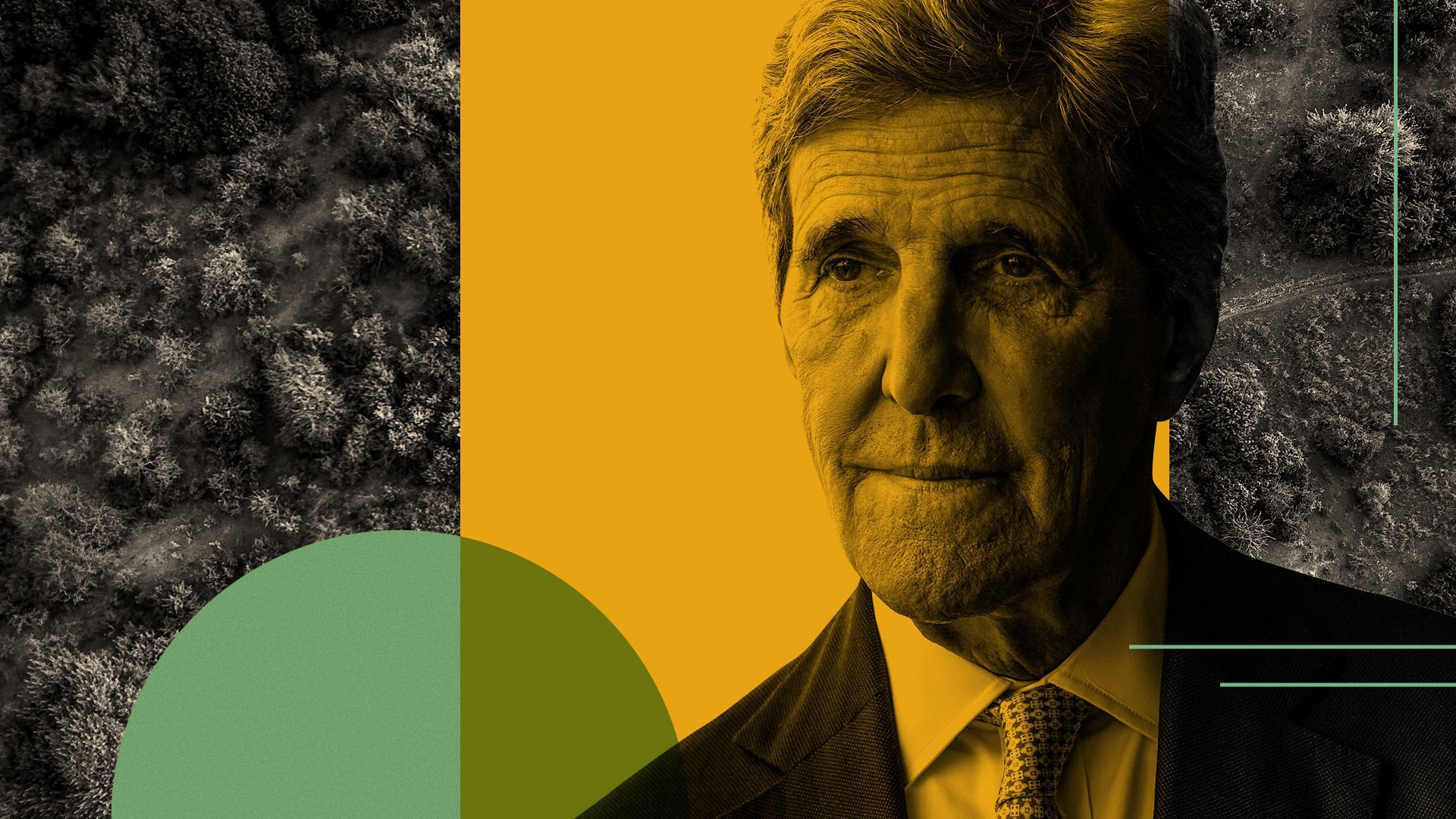 |
|
| Photo illustration: Aïda Amer/Axios. Photo: Christopher Goodney/Bloomberg via Getty Images |
| |
| This is my first COP, and I have three main observations. 1. Bringing the world together at the leader level on an issue of immense mutual concern really can generate commitments that wouldn't have existed otherwise: - New emissions targets from most individual countries; partnerships like the one to help South Africa phase out coal; big international pledges on cutting methane, ending deforestation and raising $100+ billion annually to help developing countries adapt.
- That last one is on track to be delivered in 2022, according to U.S. climate envoy John Kerry. But it was previously promised for 2020. Which leads us to point 2...
2. It's hard to know what to believe. - Brazil signed the big pledge to end deforestation, but does anyone think it will persuade President Jair Bolsonaro to suddenly protect the Amazon? And what is anyone supposed to make of this plan for financial institutions to put $130 trillion (yes, trillion) behind net zero by 2050?
3. Even if everything that's been promised here does come together, climate scientists say it may not be enough to avoid the sorts of climate catastrophes within this century where island countries disappear and major coastal cities are wiped out. So... we've got a long way to go. One key quote: After the methane pledge signing, Kerry offered a quick aside to a few reporters including our own Ben Geman about why he believes a bunch of voluntary pledges can lead to tangible progress: "We have incredible accountability through satellite measurements. And in most of this, it's peer pressure and public scrutiny and humiliation and other things that act as incentives. Go deeper: Methane limits could be COP26's real legacy |
    |
| |
| |
| A message from First Five Years Fund |
| Make early childhood education a national priority |
| |
 |
| |
| Finding and affording quality child care and early learning options should never be a burden that prevents a parent from being able to work. Now is the time to pass the Build Back Better Act and build a child care system that works for the families who need it. |
| |
| |
| Bonus: Mapping deforestation |
 |
|
| Data: Forest coverage and deforestation from Hansen, et al. 2020 version 1.8. Croplands from ESA Copernicus Land Cover 2019. Map: Carl Churchill, Woodwell Climate Research Center |
| |
| This lovely map, from cartographer Carl Churchill of the Woodwell Climate Research Center in Massachusetts, shows deforestation in protected and unprotected areas of the Amazon since 2001. - Land status, such as whether a swath of rainforest is within a protected reserve or recognized Indigenous lands, can be the determining factor in deforestation, Axios' Andrew Freedman writes.
|
    |
| |
| |
| 4. Interview: The race for green cash for Latin America |
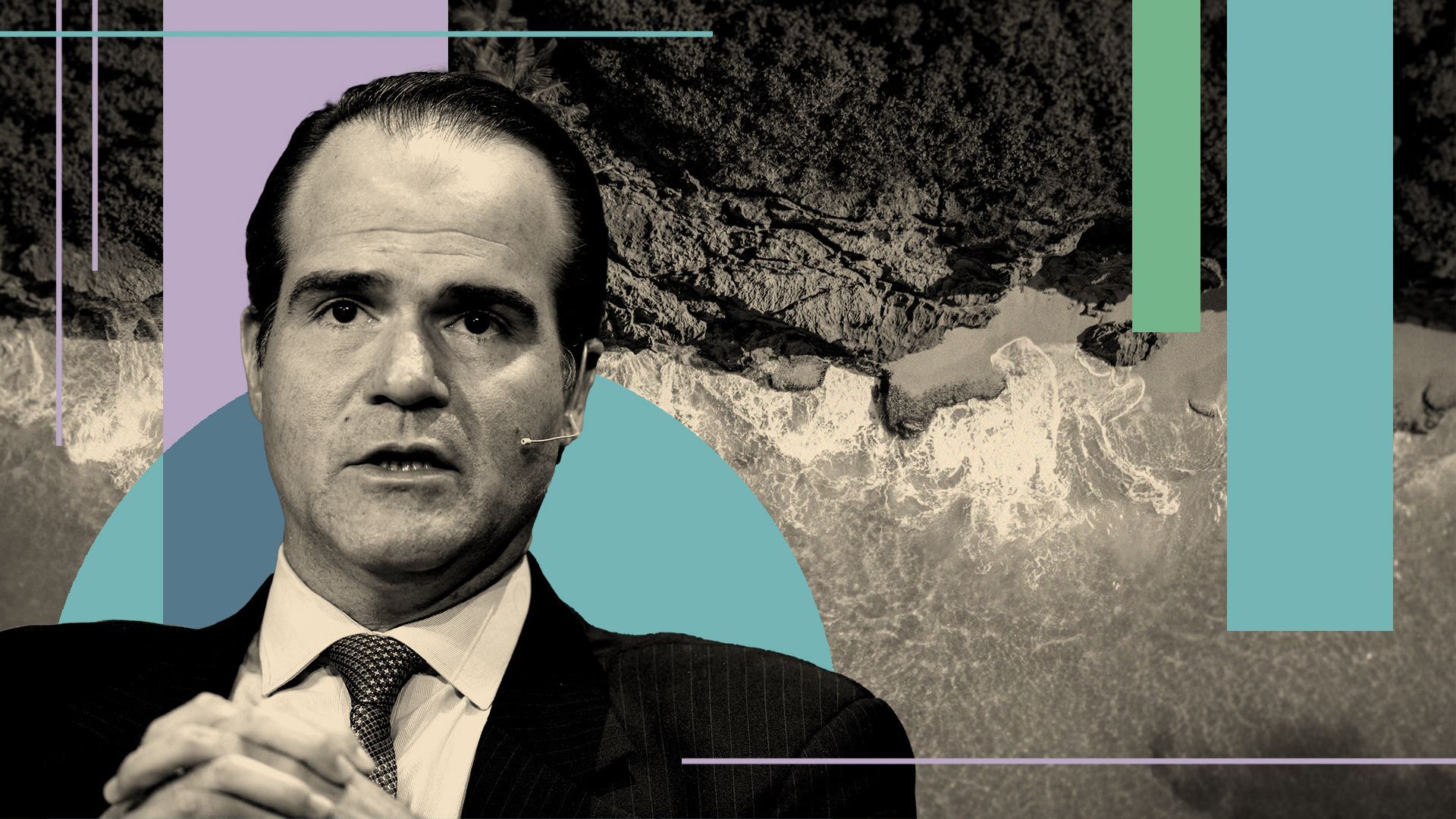 |
|
| Photo illustration: Allie Carl/Axios. Photo: Patrick T. Fallon/Getty Images |
| |
| Trillions of dollars worth of green investments are coming, and Inter-American Development Bank (IDB) President Mauricio Claver-Carone tells Axios he's "in a race" to secure a big slice of the pie for Latin America and the Caribbean. Why it matters: Climate change is causing droughts and extreme weather across the region, which in turn drive migration and threaten the food supply from the "bread basket of the world," Claver-Carone said in an interview at the COP26 climate summit. - The region needs action on climate change, he tells Axios, and it needs some of the billions or even trillions of dollars coming available to finance it.
The big picture: The numbers involved are both mind-numbingly large and vaguely defined. - A coalition of financial institutions announced Wednesday at the summit that they would mobilize up to $100 trillion in investments by 2050 to help countries reach "net zero" emissions.
Between the lines: "Green" investments are ill-defined and notoriously opaque. "Sometimes it can be a bit of a scam," Claver-Carone said. But the investor demand is clearly there. - If the IDB supports projects like transitioning a power company from fossil fuel to solar energy, private funding will flow in behind them, he says.
The state of play: Some countries in the region, such as Costa Rica and Chile, are leaning into the transition to renewable energy, he says. - But some leaders may look at recent protests over rises in fuel prices or cuts in fuel subsidies (see Ecuador in 2019 or Brazil right now) and question whether an energy transition is all upside.
- Some, like Mexican President Andrés Manuel Lopez Obrador, are clearly doubling down on fossil fuels.
Go deeper |
    |
| |
| |
| 5. Global news roundup |
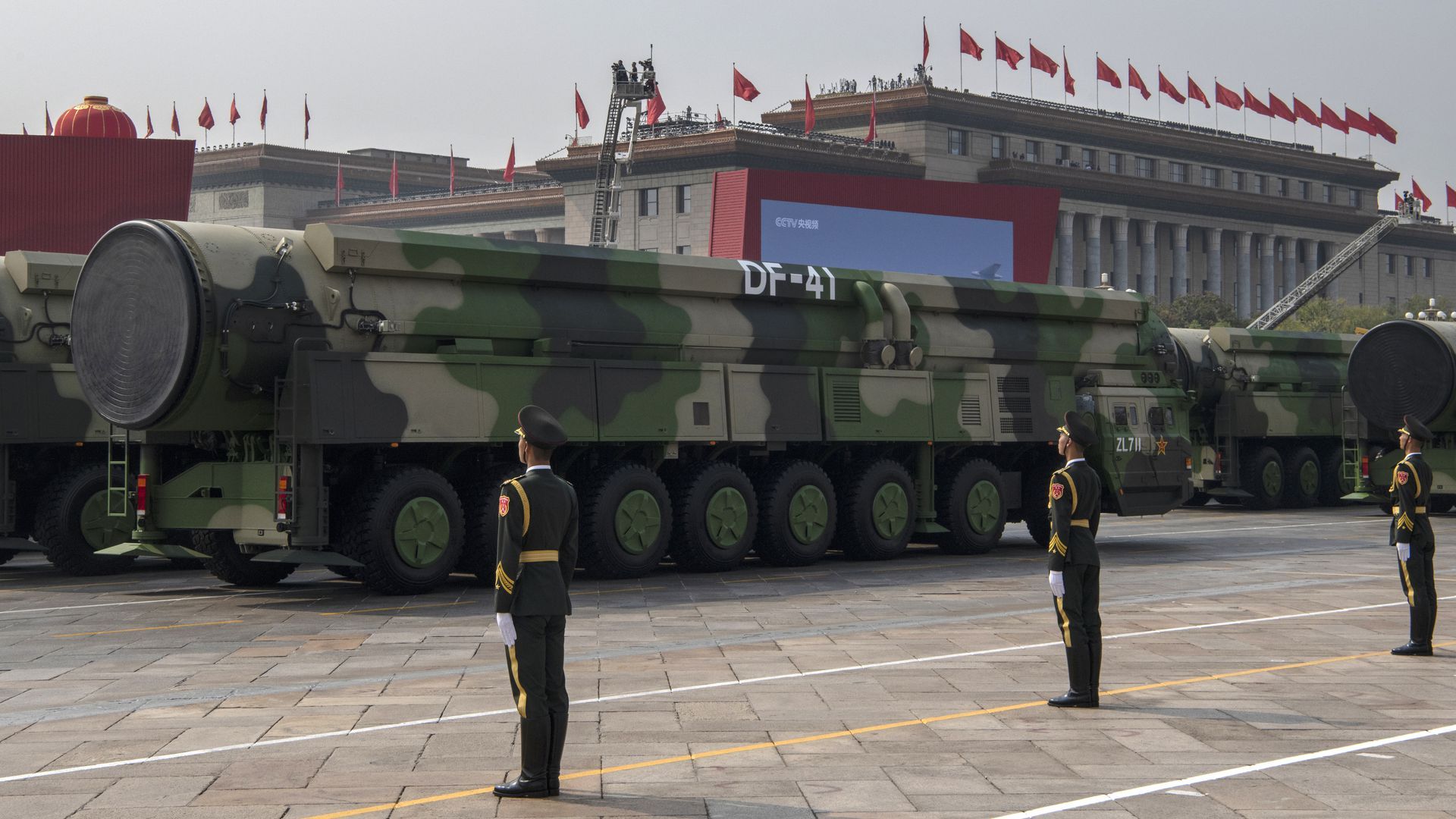 |
|
| China's intercontinental ballistic missiles shown during a military parade in 2019. Photo: Kevin Frayer/Getty Images |
| |
| 1. China is rapidly expanding its nuclear stockpile and is likely seeking to quadruple its number of nuclear warheads by 2030, according to an annual Pentagon report. 2. The Biden administration approved the potential sale of $650 million worth of arms to Saudi Arabia today, Axios' Zach Basu writes. 3. Iran has said it will resume indirect talks with the U.S. on a possible return to the 2015 nuclear deal on Nov. 29 in Vienna. 4. A "wave of fear" has gripped Addis Ababa as rebels advance toward the Ethiopian capital, the NYT reports. 5. The global vaccine gap is only getting wider, as Axios' Bob Herman lays out: - Shot: "Rich countries have given out more boosters in three months than poor countries have given total doses all year," the FT reports.
- Chaser: "Most of the negotiations for doses in the next year are coming from high-income countries and some middle-income countries," Pfizer CEO Albert Bourla said on an earnings call.
|
    |
| |
| |
| 6. Glasgow diary: Inside the climate circus |
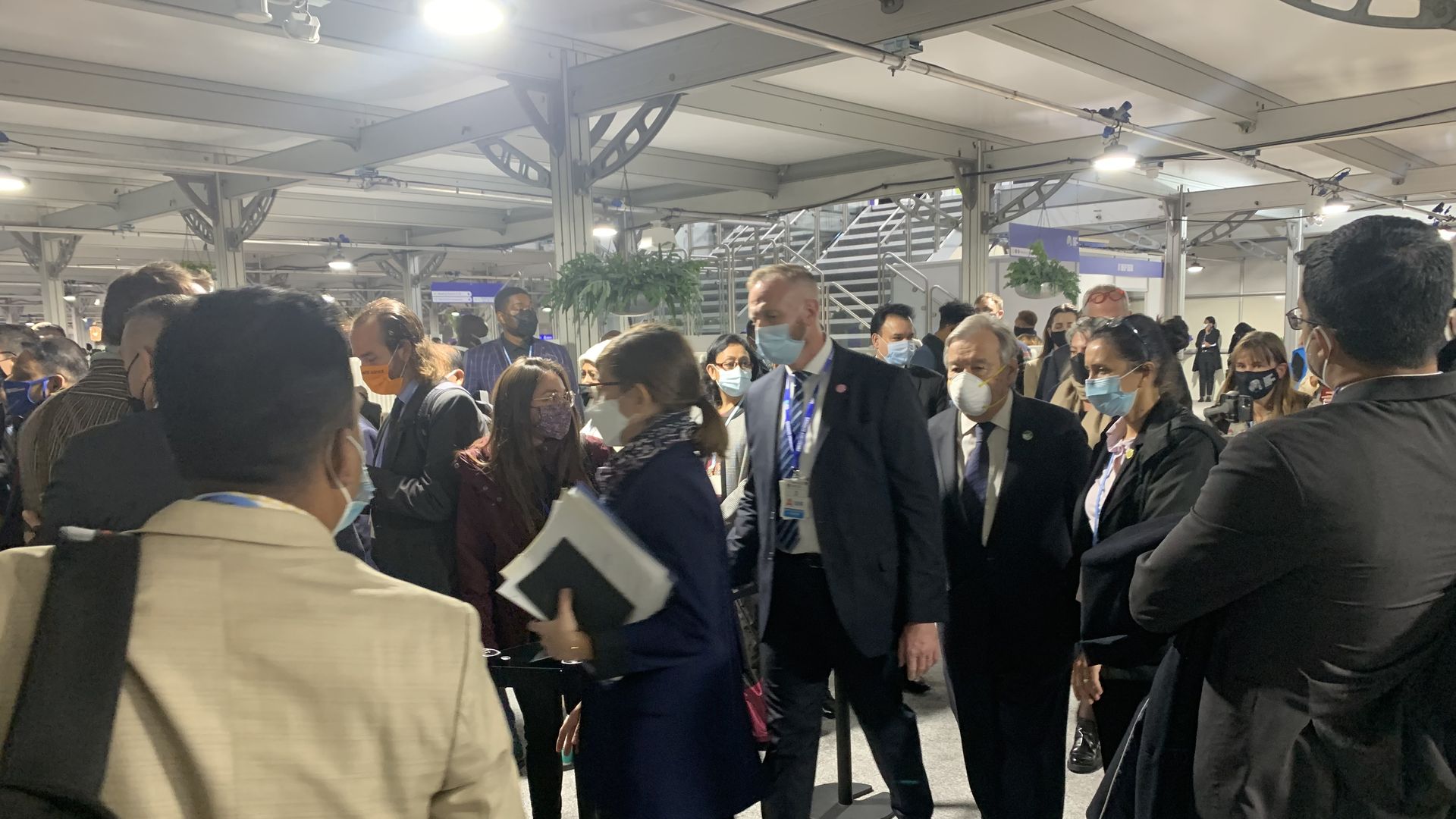 |
|
| UN Secretary-General António Guterres walks the crowded halls of COP26. Dave Lawler/Axios |
| |
| COP26 is morphing into a climate conference, filled mainly with experts, journalists and bureaucrats who specialize in the subject. For the opening days, CEO and celebrity sightings had lent a "Davos meets the UN General Assembly" vibe. Heads of state were popping up everywhere — identifiable because they don't wear ID (they don lapel pins rather than badges). - Some were mobbed by processions of shouting journalists, but most just wandered through with two or three aides or security escorts.
- Each time one appeared, I'd run a frantic mental scan to identify them, then try to come up with a question. Usually they'd already passed by.
- I did ask a passing Scott Morrison what he'd say to fellow leaders who think he's not doing enough on climate. The Australian prime minister shot me a menacing look and walked on.
COP26 can be a humbling experience. - A summit on climate adaptation in Africa was delayed when a previous meeting ran over, but no one told the presidents who kept arriving only to be apologetically turned away.
- After Zimbabwean strongman Emmerson Mnangagwa's entourage forced its way to the front, I pitied the aide who had to explain to the boss that they now had to retreat back through the crowd.
A memorable episode came when my colleague Barak Ravid, who was in Glasgow to cover Israeli Prime Minister Naftali Bennett, spotted Egyptian intelligence director Abbas Kamel stepping outside for a cigarette. - Barak gamely grabbed a smoke of his own, asked the secretive spy chief for a light, and identified himself as an Israeli reporter.
- With Kamel's aides lingering nervously, and me nibbling nearby on a rather grim sandwich, President Sisi's right-hand man chatted amiably and at some length about relations with Israel and mediating with Hamas.
You may well wonder why a spy chief would attend a climate summit. - In any event, the spies and celebrities are gone now. Let the negotiations begin.
|
    |
| |
| |
| 7. Stories we're watching |
 |
|
| Sunset on the Promenade des Anglais in Nice, France. Photo: Valery Hache/AFP via Getty |
| |
- WHO approves Indian COVID vaccine
- ICC to probe crimes against humanity in Venezuela
- Yahoo shuts down in China
- CIA director met Putin's national security adviser
- OPEC+ rebuffs Biden's demands on oil production
- World food prices hit 10-year high
- COP26: Billions committed to conservation; Carbon emissions rebound
Quoted: "Execution errors combined with confirmation bias and communication breakdowns." — The Pentagon's explanation of the Aug. 29 drone strike that killed 10 Afghan civilians. The investigation found no violations of the law. |
    |
| |
| |
| A message from First Five Years Fund |
| Make early childhood education a national priority |
| |
 |
| |
| Finding and affording quality child care and early learning options should never be a burden that prevents a parent from being able to work. Now is the time to pass the Build Back Better Act and build a child care system that works for the families who need it. |
| |
| Housekeeping note: Where in the World will return on Monday. |
 | | It'll help you deliver employee communications more effectively. | | |












No comments:
Post a Comment